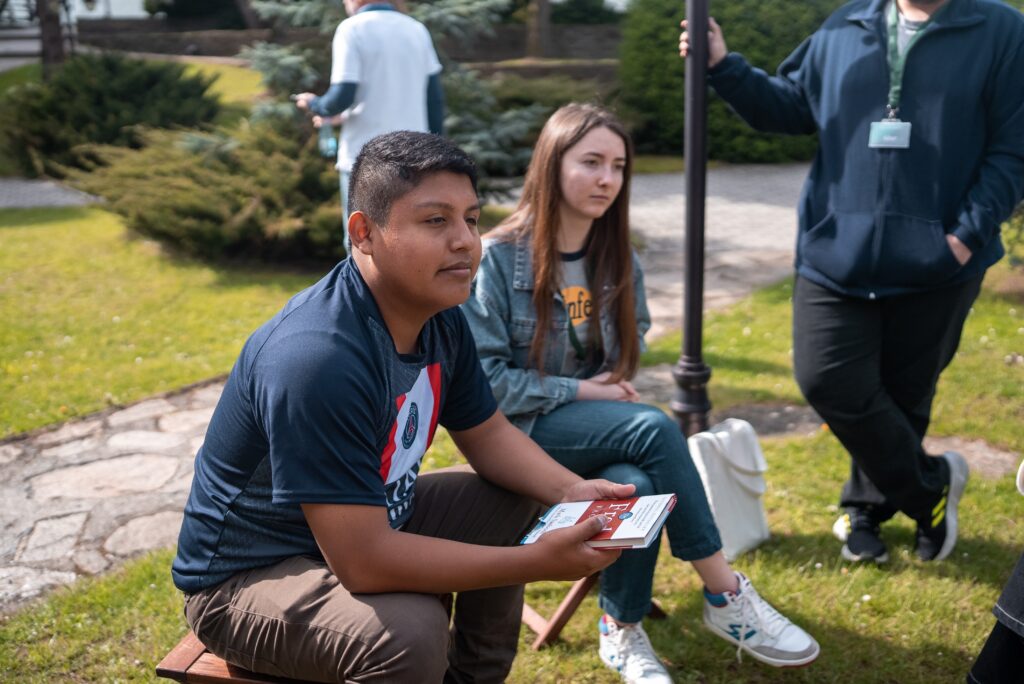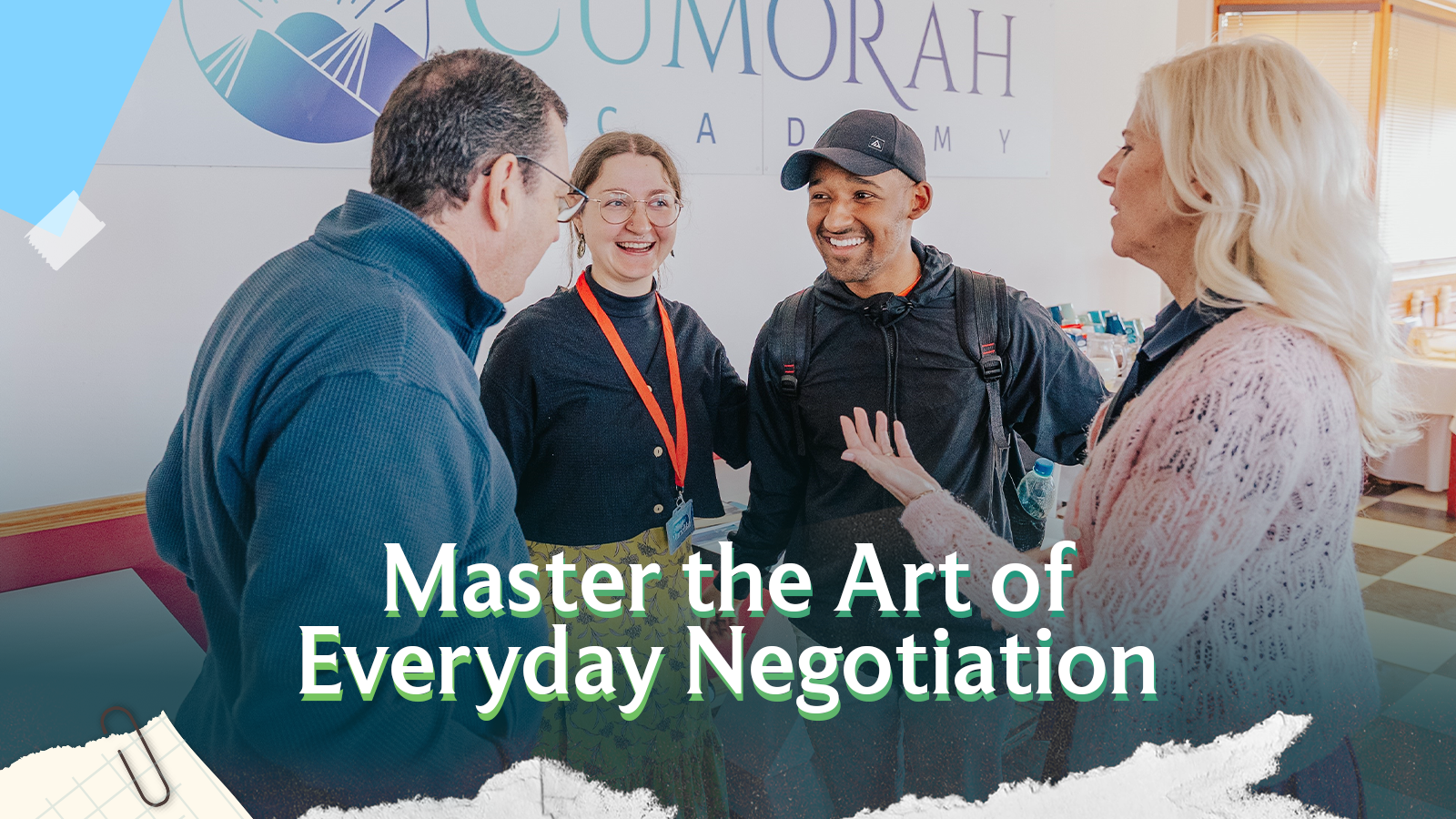Master the art of everyday negotiation—because whether you realize it or not, you’re negotiating all the time. Many people shy away from the words sale or negotiation, associating them with pushy salespeople or high-pressure situations. Maybe you’ve had a bad experience where someone tried to sell you something you didn’t need, or you felt cornered into agreeing to something you didn’t want. But here’s the truth: you are a negotiator.
From deciding which movie to watch with friends, to discussing deadlines at work, to agreeing on household chores with family, negotiation is part of daily life. Once you start to recognize it, you’ll see opportunities to use it to create better outcomes—not only for yourself but for everyone involved.
In this blog post, we’ll explore practical sales and negotiation strategies you can use in everyday life. Whether you’re looking to improve your professional skills or simply want smoother interactions at home, these principles will help you master the art of everyday negotiation.

Negotiation Is Everywhere
Pay attention to your daily routine and you’ll notice it: negotiation happens constantly. Let’s say you plan to go to the movies with friends. You’re excited about a new murder mystery starring your favorite actor. Your friends, however, are eager to watch the latest superhero blockbuster. Without even thinking about it, you’re negotiating—trying to reach an agreement that satisfies everyone.
The stakes may be small in this example, but the skills are the same ones you’ll need when discussing your salary, proposing a business deal, or handling a conflict. The great thing is, negotiation is a skill anyone can develop, and learning to master the art of everyday negotiation will pay off for the rest of your life.
Don’t React Immediately
When someone challenges your idea or decision, it’s easy to feel defensive or frustrated. Acting on that impulse, though, can lead to arguments and damaged relationships. The first step toward a better negotiation is to pause and give yourself time to think.
In chess championships, once you touch a piece, you must move it. That’s why great players think carefully before making a move—they know a rash decision could cost them the game. The same applies to negotiation: don’t rush into responding.
This pause gives you space to:
- Assess your emotions
- Clarify your goals
- Think of creative solutions
A moment of calm can mean the difference between a frustrating standoff and a productive conversation.
Attack the Problem, Not the Person
It’s easy to see the other person as your opponent, but negotiation works best when you view them as a partner in solving a shared problem. Keep your focus on the issue—not on personalities, past conflicts, or unrelated frustrations.
William Ury, a renowned negotiation expert, advises:
“Joint problem-solving revolves around interests instead of positions. You begin by identifying each side’s interests. You then explore different options for meeting those interests.”
This approach transforms the conversation from me versus you to us versus the problem. For example, instead of saying, “You never consider my preferences,” you could say, “I’d like us to find an option that works for both of us.” This subtle shift can make the other person more open to hearing you out.
Think Win-Win
Stephen R. Covey, in The 7 Habits of Highly Effective People, wrote:
“In the long run, if it isn’t a win for both of us, we both lose. That’s why win-win is the only real alternative in interdependent realities.”
In other words, a negotiation that leaves one side unhappy will cause problems down the line. The real goal is to create a solution where everyone feels they’ve gained something.
Returning to our cinema example: maybe you watch the murder mystery today and schedule the superhero movie for next weekend. Or perhaps you argue for watching the murder mystery first because it’s been in theaters for a while and might not be showing much longer. These small, creative compromises are the essence of win-win thinking.

Listen More Than You Speak
Great negotiators don’t dominate the conversation—they listen. By asking questions and paying attention to the answers, you can uncover the real motivations and needs of the other party. Sometimes, what someone asks for initially isn’t their true goal.
For example, a coworker might resist a deadline extension not because they dislike your idea, but because they’re worried it will conflict with another project. Understanding this concern allows you to address it directly and find a solution that works for both of you.
Listening also builds trust, and trust is the foundation of any successful negotiation.
Prepare Before You Step In
One of the biggest mistakes in negotiation—whether it’s buying a car or discussing vacation plans—is going in unprepared. Before any important conversation:
- Know your goals
- Understand your limits (what you will and won’t accept)
- Consider the other person’s needs and constraints
- Think of multiple possible solutions
Preparation doesn’t mean being rigid; it means being ready. The better you understand the situation, the more confident and adaptable you’ll be.
Why Mastering Everyday Negotiation Matters
When you master the art of everyday negotiation, you improve not only your professional skills but also your personal relationships. You’ll be able to:
- Resolve conflicts more smoothly
- Build stronger connections
- Get better outcomes in daily decisions
- Avoid unnecessary stress and frustration
The beauty of these strategies is that they apply across all areas of life. From business deals to family discussions, the principles are the same. And the more you practice them in small, low-pressure situations, the more natural they’ll feel in high-stakes scenarios.

Put It into Practice
Here’s a simple way to start:
- Identify one small negotiation you have each day (it could be about where to eat, how to divide tasks, or which project to prioritize).
- Apply one of the strategies above—pause before responding, focus on the problem, aim for win-win, listen deeply, or prepare in advance.
- Reflect afterward: Did it make the interaction smoother? What could you improve next time?
Over time, these micro-practices will rewire the way you approach discussions, making you a calmer, more strategic, and more effective communicator.
Learn More with Our Sales Bootcamp
If you’re ready to take these skills further, our Sales Bootcamp offers hands-on training in sales and negotiation strategies. You’ll learn not just theory but real-world techniques you can apply immediately—whether you’re closing a deal, leading a team, or navigating personal conversations.
In our program, you’ll:
- Master practical negotiation frameworks
- Learn how to influence ethically
- Build confidence in high-pressure situations
- Practice with real scenarios and feedback
Don’t let the word “sales” intimidate you. Remember, sales is just another form of communication, and negotiation is at its heart. By joining the Sales Bootcamp, you’ll gain tools to succeed in business – and in life.
Start mastering the art of everyday negotiation today. Spots in our next Sales Bootcamp are limited, so sign up now and begin your journey toward becoming a confident, effective negotiator.
Written by Fernando L. Ferreira Jr.
Supervision by Kamila Uberto Fullmer




